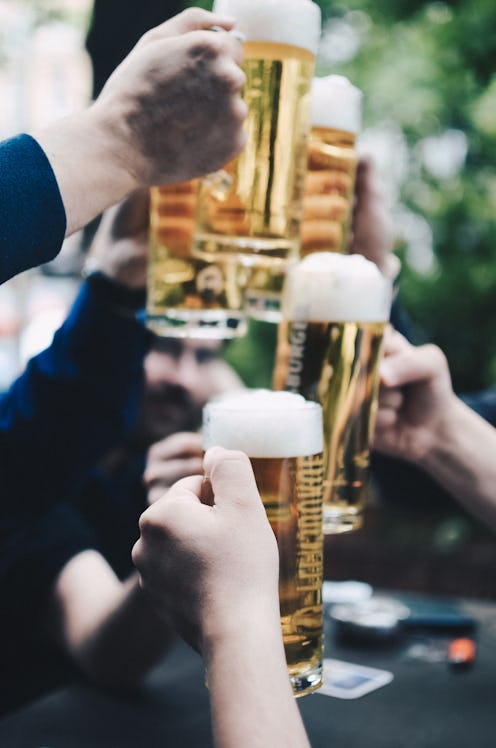Life
Can You Really Tell How Drunk You Are?

There are a lot of factors that affect how much alcohol might affect you in a given scenario, from what you've eaten that day to exactly what it is you're drinking. But when it comes to your own judgment of how drunk you are, it seems your brain relies on one particular bit of information: According to a new study, people judge how drunk they are based on how intoxicated the people around them are, rather than via some objective measure of intoxication. If you've ever wondered why you feel tipsier when you leave a bar or club than you did while you were inside, well... turns out, it's because of all those sober people outside.
In the study, which was published in the open access journal BMC Public Health, researchers tested the breath alcohol level of over 1,800 people, age 27 on average, in drinking establishments in Cardiff, Wales. About 400 of the participants also agreed to answer a few questions. Participants were asked to assess their level of intoxication and evaluate the potential risks that their current intoxication might pose to their health. Researchers found that people's assessment both of their own drunkenness and its potential consequences was based not so much on their own breath alcohol level, but on the level of intoxication at the bar or club where they were.
"Researchers have historically worked under the assumption that those who drink most alcohol incorrectly 'imagine' everyone else also drinks to excess,” the study's co-author, Simon Moore, explained. “It turns out that irrespective of how much someone has drunk, if they observe others who are more drunk than they are, they feel less at risk from drinking more."
And this has big implications for trying to reduce the negative health effects on society. Researchers and public officials can try to educate people about the risks of frequent or excessive drinking, but if people don't perceive themselves as being quite as drunk as they truly are, that education isn't going to help as much.
Simon Moore suggested that one strategy might be to find a way to increase the number of sober people in drinking establishments, though it's hard to see how people might accomplish this goal. After all, current social norms are such that going to a bar implies heavily that you're drinking, so people who don't want to drink don't tend to go to bars or other drinking establishments unless they're the designated driver. And I'm not sure how you'd change that.
But although it's hard to see how to overcome this obstacle from a public health perspective, for individuals, knowing that your perception of how drunk you are is mostly relative can be helpful. After all, once you know this phenomenon exists, you can try to counteract it by stepping outside where people are sober or talking to the (presumably sober) bartender or your designated driver and trying to judge your level of intoxication based on them — as opposed to comparing yourself to all the drunk people around you. Which might help you make more informed decisions about whether to order another round or to slow down.
Images: Quentin Dr/Unsplash; Giphy